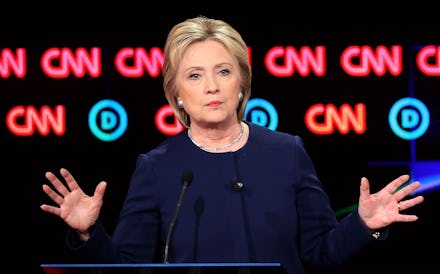Hillary Clinton Admits Supporting the 1994 Crime Bill Was a 'Mistake'

After six debates, it seems doubtful that any presidential candidate could truly offer any game-changing revelations. But during Sunday night's Democratic debate, Hillary Clinton addressed a major point of controversy in her campaign head-on: She admitted her much-criticized support of a 1994 crime bill that influenced a rise in mass incarceration was a "mistake."
"There were some aspects of it that worked well, the Violence Against Women provisions have worked well, for example," Clinton told CNN's Don Lemon during the debate, according to ThinkProgress. "But other aspects of it were a mistake and I agree."
The bill at the center of this controversy, which was signed into law by President Bill Clinton in 1994, was initially intended to curb crime. Instead, it effectively "expanded the death penalty, encouraged states to lengthen prison sentences and eliminated federal funding for inmate education," according to the Atlantic.
The effects of the bill have been especially devastating for Americans of color. Sixty percent of the U.S. prison population is now composed of people of color, despite the fact that this population makes up only about 30% of the U.S. population overall, and 1 in 3 black men can expect to be imprisoned in their lifetime, according to the Center for American Progress.
In addition to the racially charged elements of the legislation, some have argued that then-first lady Hillary Clinton's support of the bill was racist in and of itself. Clinton used "racially coded rhetoric to cast black children as animals," in her support of the bill, scholar Michelle Alexander noted in the Nation, such as referring to this group as "super-predators" with "no conscience, no empathy."
Many voters of color have recently demonstrated that they are unwilling to forgive and forget Clinton's past support of the bill. In February, for example, a video of student Ashley Williams asking Clinton to apologize for her stance on mass incarceration went viral, and further prompted Twitter users to use the hashtag #WhichHillary to interrogate her policies.
Clinton has clearly heard and processed this criticism. She said she will seek a "comprehensive" solution to the issues that have stemmed from it, according to ThinkProgress. She vowed to pursue "fixing the criminal justice system, going after systemic racism that stalks the justice system, ending private prisons and ending the incarceration of low level offenders and I am committed to doing that," according to the report.
This promise adds to those she made during a speech in February at Harlem's Schomburg Center for Research in Black Culture, in which she railed against the "epidemic of African-Americans being killed by police" and called for "real plans to combat systemic racism." She even published a plan to do just that on her website, including a proposed $2 billion to support school reform and "implement social and emotional support interventions."
Many black voters seem impressed by Clinton's plans. Polls found that Clinton especially dominates among black women voters, and those same voters crucially boosted her Super Tuesday wins.
Ultimately, despite past mistakes, Clinton's campaign is "about breaking down the barriers that stand in the way of all kids, so every one of them can live up to their God-given potential," she told the Washington Post in February, adding that her life's work has been, and presumably will continue to be, "about lifting up children and young people who've been let down by the system or by society."
h/t ThinkProgress